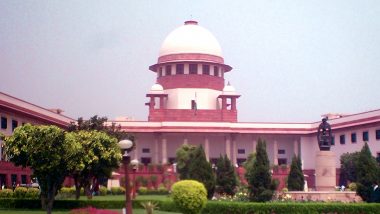New Delhi [India], May 7: The Supreme Court upheld disciplinary action taken against a judicial officer for passing orders to unduly favour certain parties saying "a judge, like Caesar's wife, must be above suspicion."
A division bench comprising Justices DY Chandrachud and Bela M Trivedi observed that "showing undue favour to a party under the guise of passing judicial orders is the worst kind of judicial dishonesty and misconduct".
"A judge must decide the case on the basis of the facts on record and the law applicable to the case", added the Bench.
"There was enough evidence and material to show that the appellant had misconducted himself while discharging his duties as a judicial officer, and had passed the judicial orders in utter disregard of the specific provisions of law, to unduly favour the subsequent purchasers of the acquired lands who had no right to claim compensation, and that such orders were actuated by corrupt motive. Under the circumstances, the High Court was perfectly justified in exercising its supervisory jurisdiction under Article 235 of the Constitution", the Supreme Court observed upholding the disciplinary action.
Supreme Court Slams Centre in Abu Salem Case, Says ‘Don’t Need Lecture From Home Secretary’
"In that view of the matter, we find no merit in the present appeal and the same is dismissed, " the apex court observed.
Quoting "a judge, like Caesar's wife, must be above suspicion", the Supreme Court remarked that it is often said that "the public servants are like fish in the water, none can say when and how a fish drank the water".
The apex court also said that if the judge decides a case for extraneous reasons, then he is not performing his duties in accordance with the law. "As often quoted, 'a judge, like Caesar's wife, must be above suspicion", the SC observed.
The top court also opined that showing undue favour to a party under the guise of passing judicial orders is the worst kind of judicial dishonesty and misconduct.
"The extraneous consideration for showing favour need not always be a monetary consideration. It is often said that the public servants are like fish in the water, none can say when and how a fish drank the water, " the Court said.
Supreme Court was hearing an appeal of the former judge against whom a full court of the Allahabad High Court, on September 02, 2006, had resolved to punish him with curtailment of pensionary benefits with immediate effect.
The Court remark came while dismissing a plea of a former official of Uttar Pradesh Judicial Services. The petitioner has challenged the Order dated April 17 2019 passed by the High Court of judicature at Allahabad, Lucknow Bench, which dismissed his plea challenging the order of punishment issued by the respondent-State pursuant to the decision of the Full Court of the High Court taken on the report of the Enquiry Officer in respect of the disciplinary proceedings initiated against the appellant for the alleged misconduct committed by him as a judicial officer.
The petitioner claimed that he had joined the Uttar Pradesh Judicial Services in the year 1978 and sought voluntary retirement from the services in September 2003. Immediately after his retirement, the appellant joined as a Judicial Member, of Central Administrative Tribunal, Mumbai Bench. On July 19 2005, the appellant was informed vide the letter dated 19.07.2005 of the O.S.D (Enquiry), Allahabad High Court, addressed to the Principal Registrar, CAT, New Delhi that the High Court had initiated a departmental enquiry against him. There were twelve charges levelled against the appellant in the said chargesheet.
It was alleged against the petition inter alia that the appellant, while posted as the 11th Additional District Judge, Agra during the period from May 23, 2001 to May 19, 2003, had decided a batch of matters under the Land Acquisition Act, 1894 and had awarded enhanced compensation which was multiple times more than the investments made by the subsequent purchasers of the acquired lands; that such subsequent purchasers had no right to claim compensation for the acquired lands; that the appellant had determined the compensation in terms of square yards and not in terms of bighas, and had awarded such compensation in flagrant violation of the cardinal principles of law and equity and against all judicial norms and propriety, with a view to unduly favour such subsequent purchasers.
It was therefore alleged that the appellant had failed to maintain absolute integrity and complete devotion to duty, and thereby had committed misconduct within the meaning of Rule-3 of UP Govt. Servants Conduct Rules, 1956.
The appellant vides the letters dated September 7, 2005 and September 9, 2005 denied all the charges levelled against him. The Enquiry Officer vide his Enquiry report dated 05.04.2006 held 11 charges as "Proved" and submitted the report to the Chief Justice/Administrative Committee/Full Court for further consideration on the question of quantum of punishment. The appellant was called upon and he filed his response on June 14, 2006 to the said Enquiry report.
The High Court of Judicature at Allahabad in its Full Court Meeting held that September 2, 2006 accepted the report of the Enquiry Officer and resolved to punish the appellant with curtailment of 90 per cent of his pensionary benefits with immediate effect.
Pursuant to the said recommendation made by the Full Court of the High Court, the respondent-State passed an order dated 22.01.2007, sanctioning withholding of 90 per cent from the pension of the appellant in view of the provisions contained in Article 351(A) of the Civil Services Regulations.
The man challenged it before the High Court of Judicature at Allahabad, Lucknow Bench, which found that the punishment order in reference to the three charges was not sustainable but recorded no ground to interfere with the rest eight charges and reduced the curtailment of pensionary benefits to the extent of 70 per cent in place of 90 per cent. (ANI)
(The above story is verified and authored by ANI staff, ANI is South Asia's leading multimedia news agency with over 100 bureaus in India, South Asia and across the globe. ANI brings the latest news on Politics and Current Affairs in India & around the World, Sports, Health, Fitness, Entertainment, & News. The views appearing in the above post do not reflect the opinions of LatestLY)













 Quickly
Quickly


